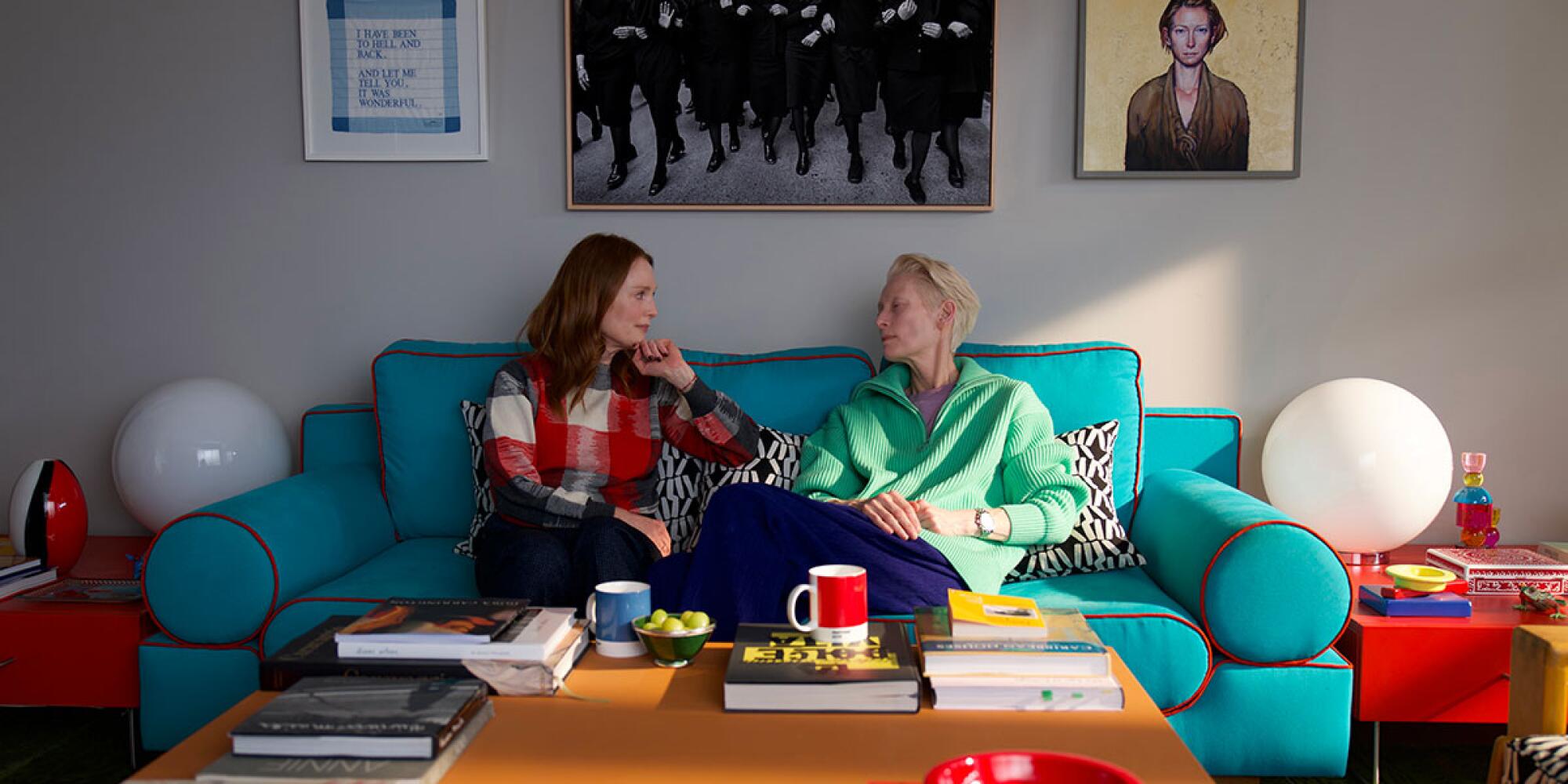
- Share via
When “The Room Next Door” premiered at the Venice Film Festival in early September, the rapturous audience gave director Pedro Almodóvar and his two stars, Tilda Swinton and Julianne Moore, a standing ovation that observers said was the longest at this year’s event. The response presaged the film’s Golden Lion victory at the festival.
“It was such an outpouring of not just love but gratitude to Pedro,” recalls Swinton of the ovation, noting that the Spanish filmmaker was about to turn 75 with more than 20 feature films under his belt. “He’s a punk rocker. He’s everlasting.”
“He’s an artist,” says Moore, “a great auteur. And it’s an opportunity for people to express that to him. And it kept coming and coming and coming and coming. It was really wonderful to be able to witness that.”
Based on Sigrid Nunez’s 2020 novel, “What Are You Going Through,” the film is an emotional two-hander starring Swinton as Martha, a successful war correspondent who discovers she is terminally ill. Taking matters into her own hands, she acquires a euthanasia pill and a short-term rental on a country house where she intends to end her life. But she doesn’t want to do it alone and asks a friendly acquaintance, Ingrid (Moore), an author and journalist, to accompany her to the house.
“The Room Next Door” is Almodóvar’s first feature in English, a language he’s not yet comfortable with. “He could make a film in Farsi or German or anything because he’s kind of not really that attentive to the language,” points out Swinton. “There are other things he’s more attentive to — the emotion, really important.”
During his childhood, Almodóvar sometimes sat and listened under the kitchen table while his mother and other women gossiped and shared secrets, Moore says. “He’s drawn to that point of view and that intrigue and that kind of drama,” she says. “He’s a man who recognizes female stories as being important.”
Pedro Almodóvar’s first book consists of a mix of short stories and personal essays that amount to ‘a fragmentary autobiography.’
The director worked quickly, Swinton says, getting two takes at most, with the actors sometimes begging for three. But the relentless pace helped forge a bond between them.
“You have to go toward each other with your hands up,” recalls Moore. “It was like we were this ball that went into work every day, this ball of energy and exchange, constantly. And that’s what the movie is, a kind of partnership.”
With death hovering over Swinton’s character, the tone sometimes got a little heavy on set, but not overwhelmingly so. Talk of mortality mixed with questions about what’s for lunch. “When one is in the presence of someone who is coming to the end of their life, you can’t sit around being sad all the time,” advises Swinton. “There will be a moment when someone says, ‘You want something to eat? What was that hilarious film we saw?’ And we watch it. That is living. Living goes on even in dying.”

Exhausting as it was to make the movie, catharsis was its reward. “I’ve been in the Ingrid position,” Swinton says of Moore’s character. “I’ve been in the blessed position of supporting people at the end of their lives. It felt like there was this open possibility to take one’s own experience and put it in the film.”
Moore agrees, considering hardship an unavoidable part of living. “The sooner you acknowledge that, the more present you’re going to be. Knowing that things are tough and painful, you have to learn to coexist with it.”
The pair counsel a similar approach to anyone disappointed by the U.S. presidential election results. “The chips are down, but that’s not necessarily a powerless place,” Swinton says. “It’s actually a very powerful state, because then people can think straight. It’s a beautiful day, we’re alive, and let’s live it and not be frightened.”
Moore agrees, adding, “You experience difficulty and pain and hardship, and you see how unequal things are in the world and you wonder what you can do and how you can do it. You can’t give up.”
But is Swinton really ready to give up acting, as press reports have suggested? Even Almodóvar sent her a panicked email about it. The actor concedes she might not have been very clear when talking about future roles. “I either said, ‘If “The Room Next Door” is my last film, I would be content because I’m so proud of it.’ Or I said, which is also true, that I always intended every film to be my last film. I intended my first film to be my last film,” she says. “It’s sort of the way I work. I’m quite lazy, in fact very lazy, to be honest, and I like feeling like my work is done.”

Both women are Oscar winners — Moore won the lead actress statuette for “Still Alice,” while Swinton scored the supporting trophy for “Michael Clayton” — but Sony Pictures Classics is submitting both for the lead actress award for this film.
“It’s just a point of accuracy,” says Swinton of the unusual decision. “This is a film in which there are two leading women, and they wrote down the truth. I would like to see Pedro up there.”
Almodóvar’s “All About My Mother” won the foreign-language film Oscar, and he scored a statuette for his “Talk to Her” screenplay, but he has yet to win a directing trophy (he was nominated for “Talk to Her”) or have one of his films nominated for best picture.
“Unfortunately, in America everything’s a competition,” Moore says. “We’re just happy to have a film that people want to see.”
More to Read
From the Oscars to the Emmys.
Get the Envelope newsletter for exclusive awards season coverage, behind-the-scenes stories from the Envelope podcast and columnist Glenn Whipp’s must-read analysis.
You may occasionally receive promotional content from the Los Angeles Times.










